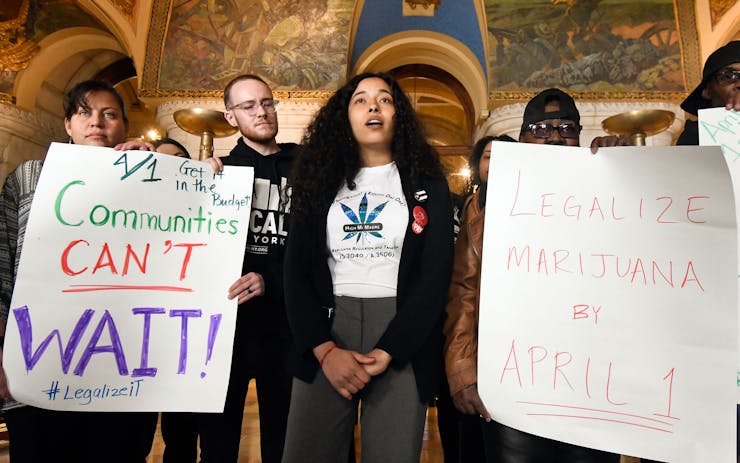Despite a recent chorus of skepticism, New York legislators are mounting a final bid for an adult-use cannabis bill before the current legislative session ends on June 19.
If this effort fails, legislators probably won't have another shot at adult-use legalization for at least two years.
Last Friday, a group of State Senators unveiled Bill 1527A, which aims to merge the progressive Marijuana Regulation and Taxation Act (MRTA)—which has been introduced several times since 2013—with the legislation that failed to pass as part of this fiscal year’s budget.
Although Governor Cuomo has recently stated that he won’t use his political clout to persuade on-the-fence lawmakers to support the bill, the bill’s compromises may be enough to convince him to “twist arms.” 1527A presents a sort of final shot at legalization for the moment; if it fails to pass, it’s unlikely that legislators will have another stab at cannabis for at least two years.
Merging Two Bills
According to state Sen. Liz Krueger, who represents parts of Manhattan and is an original sponsor of MRTA, 1527A picks up where the legislation proposed during the budget talks left off. “We’ve attempted to take all of the negotiated agreements that took place during budget negotiations and expand our bill,” she said.
The personal possession limit would drop from two pounds to three ounces.
“You should be willing to use the art of compromise to come up with something that gets you to your goal,” added Democratic Majority Leader Crystal Peoples-Stokes, who sponsored the bill in the State Assembly.
The revised bill greatly expands of the Office of Cannabis Management, a regulatory body proposed by Gov. Cuomo. In the new bill, that office will oversee virtually every facet of the recreational cannabis market, the state’s medical cannabis program, and the state’s hemp and CBD markets as well.
The bill limits the amount of cannabis an individual can possess. While the original legislation put a cap at two pounds, 1527A lowers the maximum to three ounces.
Furthermore, it also includes a tax hike. Each gram of cannabis would now be taxed at a rate of one dollar, versus the previous proposal of 62 cents.
Social Justice Measures
1527A retains many of the progressive measures for social equity that have long been central to MRTA. The new bill preserves its mission of “significant dedicated investment in communities most harmed by marijuana prohibition, equity in the industry, permitting individuals to grow cannabis for personal use, and addressing past criminal convictions,” says Peoples-Stokes.
Shop highly rated dispensaries near you
Showing you dispensaries nearInstead of merely sealing the records of individuals with cannabis-related charges—a process in which the record still exists—the new bill will ensure that those individuals will have their records fully erased, or expunged. That decision will have significant impact on thousands of people seeking jobs or housing, and provide particular relief to communities of color. The bill arrives on the heels of a new report that shows that between 2010 to 2018, 81% of people arrested for low-level marijuana possession in the upstate city of Rochester were black. According to the 2010 census, black people make up 42% of Rochester’s population.
No Custody Penalty
The new bill also addresses the frequent (and already illegal) use of cannabis as a justification to separate low-income and minority children from their parents, a practice that has recently been brought to light by WNYC and further documented by Leafly. “It is the intent of this act that no child shall be the subject of a child neglect or abuse investigation or proceeding based solely on a parent’s alleged marihuana use, or activity made lawful by this act,” reads the bill. “A newborn child’s positive toxicology result for marihuana, is not sufficient on its own to support a finding of child neglect or abuse.”
Finally, while the original bill put an emphasis on giving licenses to individuals with prior cannabis-related convictions, 1527A expands that category to include any individual who “had a parent, guardian, child, spouse, or dependent, or was a dependent of an individual” affected by the war on drugs.
A Political Chess Game
Legislators including Krueger believe that the bill currently doesn’t currently have enough support to pass in the Senate, so she’s hoping the bill will pass in the State Assembly first, giving it momentum and a fighting chance in the Senate.
“Then I can try to make the case that people who might have been scared away when it dropped out of the budget should come back to vote for it,” Krueger said.
If lawmakers end the legislative session in June without approving a bill, she added, they will have “flunked the assignment.”
Backup: An Expanded Medical Bill
In the midst of the revised adult-use bill, State Senators Diane Savino and Richard Gottfried have cooked up an expanded medical bill that, if 1527A fails to pass, could provide a stopgap measure for the state’s stunted cannabis industry.
New York’s current medical program is meager at best. There are only 100,000 patients (in a state of nearly 20 million people) and only ten companies have licenses to sell medical cannabis. The updated bill loosens the language around qualifying conditions; it eliminates terms like “serious” and “severe debilitating or life threatening,” and allows a doctor to certify a patient to use cannabis regardless of whether any of the qualifying conditions apply.
Furthermore, the medical bill would double the number of dispensaries each licensed company is allowed to operate. The current law only allows for the sale of tinctures and oils; the new bill would finally legalize cannabis flower.
“One of the things that’s been abundantly clear from the very beginning is that this was a narrow program that only served a small number of patients,” Savino said. “We saw some improvements over the years, but now we’re trying to really close those remaining gaps.”





